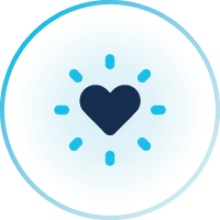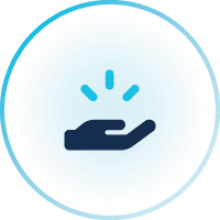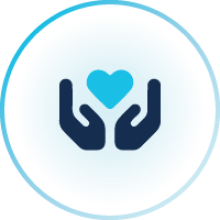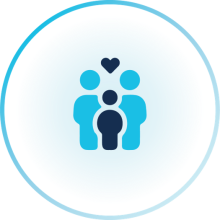Coordinated Specialty Care
Treatment for early serious mental illness
When a young person is impacted by unexpected changes in their thinking and perceptions, it can get in the way of everyday activities, make school or work difficult, affect relationships, and interrupt life goals and dreams.
These changes, sometimes referred to as early serious mental illness or first episode psychosis, are unique to each individual.
Common symptoms include:
- Extreme distrust of others
- Fixation with false beliefs
- Jumbled thoughts and speech
- Seeing, hearing, or feeling things others don't
- Strange thoughts or views
Serious mental illnesses include:
- Bipolar disorder
- Major depressive disorder
- Schizophrenia
- Schizoaffective disorder
Coordinated Specialty Care—or CSC—offers a path to recovery.
A proven way to support young people
Providers of Coordinated Specialty Care connect people ages 15 to 25 to supports in their community dedicated to helping participants move past their mental health challenges. It is an approach based on the latest science of what works for people experiencing an early serious mental illness or first episode psychosis.
Coordinated Specialty Care programs focus on building the participant's sense of purpose, empowerment, and relationships. This is done through outreach activities, supports from the community, and collaboration among service providers and participants.
Purpose
Participants are supported in having independence and resources to reach their full potential.
Empowerment
Participants have voice and choice so that their journey is grounded in their goals and values.
Relationships
Participants benefit from meaningful connections with service providers, friends, family members, and others focused on helping them live their best lives.
Outreach
Providers educate the community so that young people who need help know when and how to access it early.
Community
Services and supports take place in the most inclusive, responsive, and accessible settings and draw on the connection of family, friends, and natural supports.
Collaboration
Team members and participants
work together. They share
responsibility for setting up, making
happen, watching over, and reviewing
a treatment plan.
Personalized services
Coordinated Specialty Care is a comprehensive set of services guided by the goals and preferences of the participant. Care coordinators ensure services are delivered as desired. The services may include help:
- Considering strategies to manage a mental illness, like medications.
- Sorting out life concerns.
- Discovering new skills.
- Staying in school or getting back to school.
- Getting and keeping a job.
Positive outcomes
Coordinated Specialty Care has a positive impact on participants, providers, and communities through reduced wait times for services, reduced lost wages due to missed work, fewer health care costs related to inpatient care and emergency room visits, fewer justice system interactions, and decreasing reliance on long-term support.
Learn more about the benefits of Coordinated Specialty Care.
Individual help
Four programs serving 11 counties currently offer Coordinated Specialty Care. See where this approach to service delivery is available in Wisconsin.
Find a program
Provider help
Support is available for service providers working with people experiencing early serious mental illness or first episode psychosis. See information on training and technical assistance opportunities.
Explore resources
Implementation help
Tribal nation and county interest in Coordinated Specialty Care is growing. Learn how to apply this model of care as a stand-alone program or as part of an existing program.
Get started








